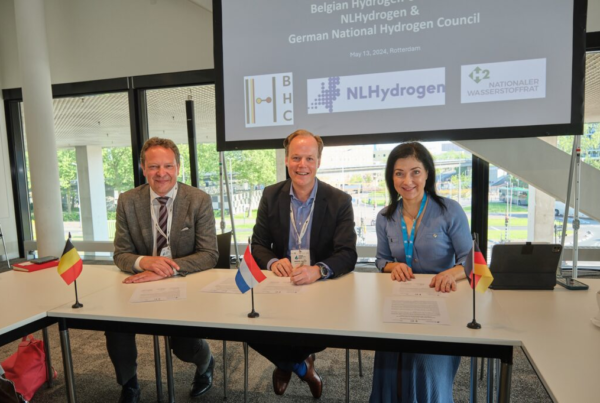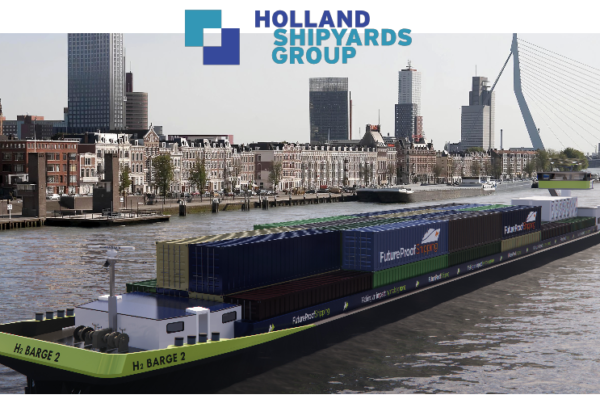
China wants to be self-sufficient in energy and make the rest of the world dependent on them. This can be deduced from official statements and documents from the country. The geopolitical consequences of this can be far-reaching, but also directly affect the pace and costs of our energy transition. When it comes to offshore wind energy and electrolysis, needed to make green hydrogen, Europe must therefore take measures to avoid strategic dependencies.
Read the research
Read in the study ‘The EU’s China challenge: Rethinking offshore wind and electrolysis strategies and dependencies’ about China’s current and future role in wind energy and electrolysis.
Download the study (note that it is in English) (pdf)(opens in new window)
This is the conclusion of researchers from TNO and the Hague Center for Strategic Studies (HCSS) in the report ‘The EU’s China challenge: Rethinking offshore wind and electrolysis strategies and dependencies’ . It provides an analysis of China’s current and future role in the wind energy and electrolysis supply chains. The research was conducted at the request of the China Knowledge Network (CKN) of the Clingendael Institute/LeidenAsiaCentre with support from the Ministry of Economic Affairs and Climate and the Ministry of Foreign Affairs.
The world uses raw materials from China for energy transition
‘China keeps the market structurally closed to European parties, but expects free access for their products on our continent. This is one of the reasons why they are building up a position that allows them to compete excellently on price. Furthermore, the world relies heavily on China for the energy transition for the use of raw materials, including rare earth metals. The latter are very important for making wind turbine parts. President Xi speaks explicitly about the geopolitical need to make supply chains more dependent on China. That entails major risks,” says Joris Teer, strategic analyst and China specialist at the HCSS.
Geopolitical analysis with knowledge about Chinese technology and market
The report combines HCSS’s geopolitical analyzes with TNO’s technological and market knowledge in the field of energy and materials. Karlien Sambell from TNO Vector and her fellow researchers mapped the value chain of offshore wind and electrolysis. They studied how this has developed in the major trading blocs EU, China and the US in recent years and what can be expected in the coming years. In addition to literature research, dozens of interviews were also held with policy makers, companies, business organizations and universities in various countries.
‘China is still a black box in many areas. It is quite complicated to get the right information. It is difficult to explain what exactly is happening in the electrolysis and wind energy market. But thanks to the combined expertise of HCSS and TNO, we have been able to paint a picture supported by facts,” she says.
Offshore wind technology: prevent strategic dependency
It turned out that China has almost a monopoly on the production of permanent magnets, an essential part of wind turbines. The country has developed strongly in offshore wind technology in recent years and is expected to strengthen its position on the world stage in the coming years. It is therefore important to continue to cooperate with China where this is possible in a responsible manner, but at the same time avoid unwanted strategic dependencies.
TNO researcher Sam Lamboo: ‘The major producers of wind turbines in Europe have suffered significant losses in recent years for a variety of reasons. The question is how to maintain production capacity in Europe and what interventions are required to achieve this. If European producers do not survive this difficult period, dependence on China for technology is likely to increase rapidly. The market for electrolysis is also developing rapidly in China in recent years. The Chinese have completely focused on alkaline electrolysers, while Europe is strong in both PEM technology and alkaline. It is still a young market with many uncertainties about how it will develop. The question again and again is how you can prevent yourself from being completely dependent on China for equipment and components. Will the market be flooded in a few years by cheap alkaline electrolysers from China or will we pay the price for independence by opting for more expensive home-grown equipment?’
Strategic choices in the Netherlands, Europe and the business community
According to Joris Teer, these are strategic considerations that must be made at both national and European level. But the business community will also have to choose whether in the short term to opt for cheaper Chinese products with the risk of dependence on maintenance parts, or do you invest in more expensive products in the longer term that offer you much more security?
‘Think of Russia turning off the gas tap. Because dependence on that gas was used as a weapon, many companies are still in serious trouble today. This can also be the case with wind energy. Suppose you invest in cheaper Chinese complex components, then you are dependent on them for maintenance and replacement. From a geopolitical point of view, that is an extremely bad idea, especially now that wind energy is becoming an increasingly important part of our energy mix. The war in Ukraine shows: within months, economic relations between countries can become untenable. As a result of a military crisis in East Asia, European-Chinese relations could suddenly deteriorate to an extreme extent. Hedging those risks by protecting the market and supporting European parties costs money, but makes you much less dependent.’
Restrictive measures required from the EU
To stimulate and protect its own industry, the EU will have to take restrictive measures to enforce a level playing field. According to the researchers, one possibility is to tighten standards in the areas of safety, quality, working conditions and environmental standards. Member States can also impose stricter requirements when it comes to national security and security of energy supply. And as long as China does not open its market, only companies from trusted countries would be able to tender for large tenders for vital infrastructure such as offshore wind farms. This is also possible for large tenders in the field of electrolysis.
‘Then you are not talking about technical innovations but policy innovations. Consider cooperation with like-minded countries within and outside the EU to guarantee the availability of sufficient alternatives to Chinese wind energy and electrolysers,” says Joris Teer.
SOURCE: TNO
Read the most up to date Fuel Cell and Hydrogen Industry news at FuelCellsWorks




